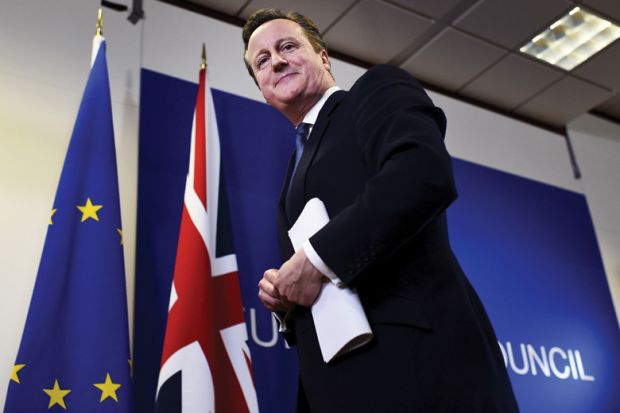The UK leaving the European Union would create “a huge problem” for UK universities in new barriers to European research collaboration while damaging higher education across the Continent, according to senior figures in the German sector.
Universities UK has been running a campaign to highlight the benefits of membership to the nation’s universities that will gain increased presence now that David Cameron has set the date of the referendum on the nation’s EU membership for 23 June.
The future of relations between universities from the UK and Germany – the EU’s most populous nation, its largest economy and one of its leading players in higher education – could be altered by a Brexit.
Horst Hippler, president of the German Rectors’ Conference (the Hochschulrektorenkonferenz or HRK, Germany’s equivalent of UUK), told Times Higher Education: “To have Britain no longer belonging to the EU would be a disaster for international research in Europe.”
He added that “we have this problem already with Switzerland”, referring to the fallout after Swiss voters backed tougher restrictions on immigration in a 2014 referendum. After the vote, the EU temporarily suspended talks with Switzerland, which is not an EU member, over its participation as an associated country in the union's Horizon 2020 research and Erasmus+ student mobility programmes.
Higher education opponents of a Brexit argue that the Swiss case shows that the UK may find it hard to leave the EU while retaining access to key programmes in research and student mobility.
“When you’re no longer a member and just want to do some ‘raisin picking’, there will be a problem,” said Professor Hippler, a former president of the Karlsruhe Institute of Technology.
A Brexit would represent “a huge problem because research and science is always international”, he warned. “It would just increase barriers between Germany and Great Britain for exchange and all these things, which at the moment is very open.”
He added of what might happen after a Brexit: “Would [the UK] introduce visas? If you would introduce visas then it would be a big problem [in higher education].”
The HRK has discussed “intensively” the EU referendum with UUK, said Professor Hippler. “We strongly support UUK in all their efforts to convince the public to vote for Europe,” he added.
Bernd Huber, president of LMU Munich and former chairman of the League of European Research Universities, said that his personal view was that “Britain leaving the EU – whatever this means, that’s part of the debate – it would really be a catastrophe.”
He added that “one of the reasons is that the UK always stands for competition and for performance [in higher education] – that’s a very important element in the European debate”.
The president of LMU, the highest-ranked German institution in the 2015-16 THE World University Rankings (29th place), added: “The whole approach to higher education policy within the rest of Europe…that would change without the membership of the UK, because the UK has these very good universities, has this idea of performance incentives.
“This philosophy, this view and this perspective would be lost on the [European] higher education scene.”
Register to continue
Why register?
- Registration is free and only takes a moment
- Once registered, you can read 3 articles a month
- Sign up for our newsletter
Subscribe
Or subscribe for unlimited access to:
- Unlimited access to news, views, insights & reviews
- Digital editions
- Digital access to THE’s university and college rankings analysis
Already registered or a current subscriber?







